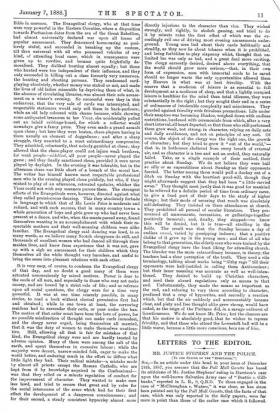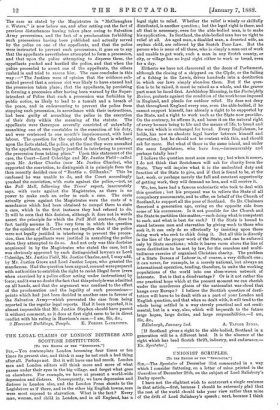LETTERS TO TIIE EDITOR.
MR. JUSTICE STEPHEN AND THE POLICE.
[To TRY EDITOR Of TER " SPECTATOR:1
Sra,—In an article under this head in your issue of December 24th, 1887, you assume that the Pall Mall Gazelle has based its criticisms of Mr. Justice Stephens' ruling in Harrison's case upon the well-known Salvation Army case of "Beattie v. Gill- banks," reported in L. R., 9, Q.B.D. To those engaged in the case of " licClenaghan v. Waters," it was clear, as has since been pointed out by the Pail Mall Gazette, that the facts of that case, which was only reported in the daily papers, were far more in point than those of the earlier case which it followed.
'The case as stated by the Magistrates in "McClenaghan v. Waters," is now before me, and after setting out the fact of previous disturbances having taken place owing to Salvation Army processions, and the fact of a proclamation forbidding such processions having been published and actually served by the police on one of the appellants, and that the police were instructed to prevent such processions, it goes on to say that the appellants nevertheless attempted to form a procession, and that upon the police attempting to disperse them, the -appellants pushed and bustled the police, and that when the police proceeded to arrest one of the appellants, the others rushed in and tried to rescue him. The case concludes in this -way :—" The Justices were of opinion that the evidence sub- mitted proved that a serious riot was likely to have ensued had the procession taken place ; that the appellants, by persisting in forming a procession after having been warned by the Super- intendent of Police that such a procession was forbidden by public notice, as likely to lead to a tumult and a breach of the peace, and in endeavouring to prevent the police from stopping such procession, in accordance with their instructions, had been guilty of assaulting the police in the execution of their duty within the meaning of the statute. The -appellants were thereupon severally convicted of unlawfully :assaulting one of the constables in the execution of his duty, and were sentenced to one month's imprisonment, with hard labour. The question for the opinion of the Court is whether, upon the facts stated, the police, at the time they were assaulted by the appellants, were legally justified in interfering to prevent the procession from taking place." Upon this statement of the ease, the Court—Lord Coleridge and Mr. Justice Field—called upon Mr. Arthur Charles (now Mr. Justice Charles), who -supported the conviction, to distinguish it in principle from the • then recently decided case of "Beattie v. Gillbanks." This he confessed he was unable to do, and the Court accordingly quashed the conviction, with costs against the police,—not, as the Pall Mall, following the Times' report, inaccurately says, with costs against the Magistrates, as there is no power to make such an order in such a case. The costs actually given against the Magistrates were the costs of a mandamus which had been obtained to compel them to state a case, which in the first instance they had refused to do. It will be seen that this decision, although it does not in words assert the principle for which the Pall Mall contends, does in - fact tacitly assume it. The very form in which the question - for the opinion of the Court was put implies that if the police were not legally justified in interfering to prevent the proces- sion, then the appellants were justified in assaulting the police • when they attempted to do so. And not only was this doctrine acquiesced in by the Magistrates who stated the case, but it was obviously approved by such distinguished lawyers as Lord • Coleridge, Mr. Justice Field, Mr. Justice Charles, and, I may add, by Mr. Justice Grove and Lord Justice Lopes, who granted the mandamus. Had the question been argued, counsel were prepared with authorities to establish the right to resist illegal force (even when exercised by a police officer acting under instructions) by - force; and it was no doubt the fact that this principle was admitted on all hands, and that the argument was confined to the effect • of the proclamation and the legality of such processions— points which had just been decided in another case in favour of -the Salvation Army—which prevented the case from being reported in the regular legal reports. Had it been reported, it is - almost impossible that Mr. Justice Stephen should have passed it without comment, as it does at first sight seem to be in direct conflict with his ruling in Harrison's case.—I am, Sir, Sm., 2 Harcourt Buildings, Temple. E. FORBES LANKF,STER.























































 Previous page
Previous page